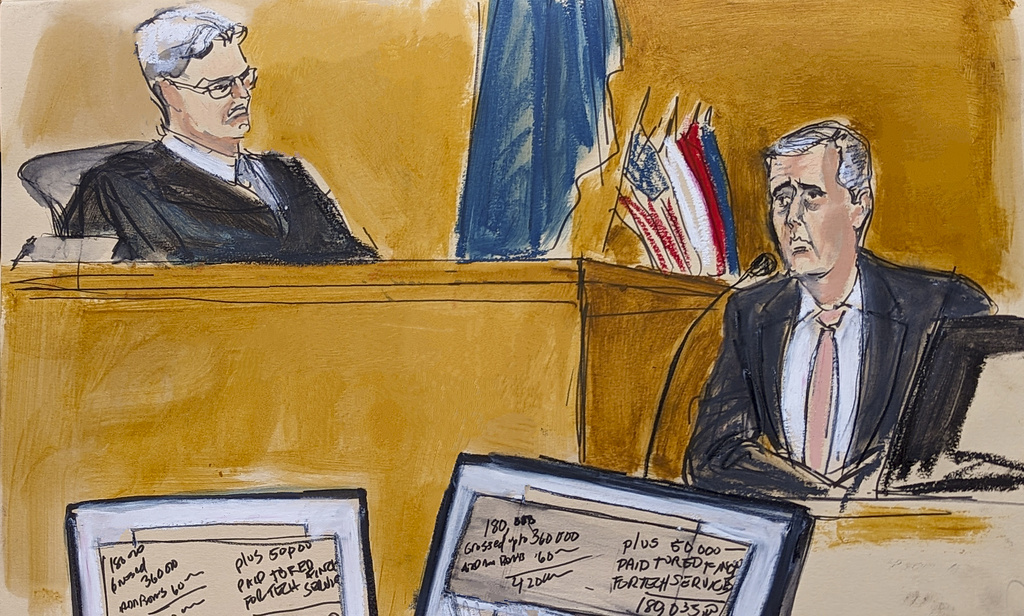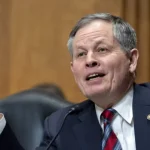
Michael Cohen offered the strongest evidence to date linking former President Donald Trump to the charges he is facing in New York, serving as either a blessing or a curse to prosecutors, depending on whether the jury finds their troubled star witness credible.
Cohen, Trump’s former attorney, testified Monday during Trump’s trial that the former president knew every step of the way how Cohen was working to prevent porn star Stormy Daniels from going public right before the 2016 election with a claim that she had a sexual encounter with Trump.
Prosecutors presented evidence that Cohen had two phone calls with Trump right before Cohen went to the bank to use a shell company to wire Daniels’s attorney $130,000 as part of a settlement agreement.
“I wanted to ensure that, once again, he approved what I was doing because I require approval from him on all of this,” Cohen said of the two calls.

Prosecutor Susan Hoffinger, who led the questioning of Cohen, asked whether he would have made the payment without Trump approving it.
“No,” Cohen testified, adding that “everything required Mr. Trump’s signoff. On top of that, I wanted the money back.”
Cohen repeatedly spoke to how involved Trump was in his work, which, Cohen said, involved renegotiating invoices, fighting with the media about bad press, and sometimes bullying or lying.
Cohen said he and Trump spoke daily, that Trump was a micromanager, and that the former president expected to be updated “immediately” on any new developments in Cohen’s day to day, giving prosecutors foundational testimony about how Trump must have had intimate knowledge about the Daniels payment.
At issue in the trial is a payment Trump made to Cohen in 2017 that included, according to evidence, a reimbursement for the money Cohen paid Daniels to help Trump’s campaign less than two weeks before the presidential election.
Manhattan District Attorney Alvin Bragg charged Trump with 34 counts of falsifying business records, alleging that Trump hid the reimbursement and that he did so “with intent to defraud and intent to commit another crime and aid and conceal the commission thereof.”
Cohen, who pleaded guilty in 2018 to several crimes, including a campaign finance violation for his payment to Daniels, lying to a bank, lying to Congress, and tax evasion, is prosecutors’ best chance of proving Trump acted with intent and had knowledge of the illegalities surrounding the Daniels payment.
Bragg is aiming to prove Trump knowingly buried the reimbursement as part of a conspiracy with Cohen to influence his campaign. The reimbursement appeared on the Trump Organization’s books as $420,000 in “legal expenses” paid over 12 months in 2017. In addition to the reimbursement for Cohen, evidence shows, the payment included a bonus, a payment for unrelated technology services, and money to cover taxes.
The payment records also included the brief note that the money was for a “retainer.” Retainers can be verbal agreements, but prosecutors have said no retainer existed between Cohen and Trump and that no legal services were rendered.
Trump’s defense team has suggested “legal expenses” was the appropriate way to document the payment to Cohen, who in January 2017 was no longer on the Trump Organization’s payroll but rather worked for Trump as an outside vendor with the title “personal counsel.”
Hoffinger asked Cohen if he expected Trump to pay him for any work in 2017, and Cohen said no.
“Because I knew there was going to be no compensation,” Cohen said, explaining that he and Trump agreed his only payments as Trump’s personal counsel beginning in 2017 would come from outside work Cohen performed for third parties.
Cohen also spoke about former Trump Organization Chief Financial Officer Allen Weisselberg, who is serving a jail sentence for perjury. Several witnesses, including Cohen, have said Weisselberg was the mastermind behind the payment plan for Cohen.
Cohen testified that he approached Weisselberg in January 2017 seeking reimbursement after Cohen personally had footed the bill for Daniels right before the election. Weisselberg came up with the payment plan, and then the pair told Trump about it and Trump approved it, Cohen claimed.
Prosecutors have sought to prove Trump’s entire motivation for working with Cohen to pay off Daniels was to save his campaign, but defense attorneys have countered that assertion by indicating Trump was also worried about the opinion of his wife, Melania, and how an affair story from a porn star would affect his family.
Cohen, however, testified that Trump “wasn’t even thinking about Melania.”
“This was all about the campaign,” Cohen said, noting that in the wake of the infamous Access Hollywood tape’s release, Daniels’s allegation would be “catastrophic” for Trump’s campaign.
“Just take care of it,” Cohen recalled Trump telling him.
Trump’s fixer obeyed and negotiated the settlement agreement with Daniels’s then-attorney Keith Davidson, and Cohen said Trump urged him to delay making the payment for as long as possible.
“I want you to just push it out as long as you can. Just get past the election because if I win, it will have no relevance because I’m president. And if I lose, I don’t even care,” Trump said, according to Cohen.
Cohen’s claims, if true, could be convincing for the jury as it weighs whether Trump knowingly acted with intent to falsify his payment records and violate campaign finance rules.
Prosecutors plan to continue questioning Cohen on Tuesday, but then the tables will turn to Trump’s defense attorneys to cross-examine Cohen.
CLICK HERE TO READ MORE FROM THE WASHINGTON EXAMINER
They are expected to attempt to wreck Cohen’s credibility, painting him as a felon with a history of perjury who has demonstrated time and again that he wants nothing more than to get revenge on his former boss.
Prosecutors on Monday made efforts to humanize Cohen, who spoke about his background and how he was “honored” to work for Trump. Defense attorneys will have to balance chipping away at Cohen’s credibility with not going too far as to cause him to draw pity from the jury.





